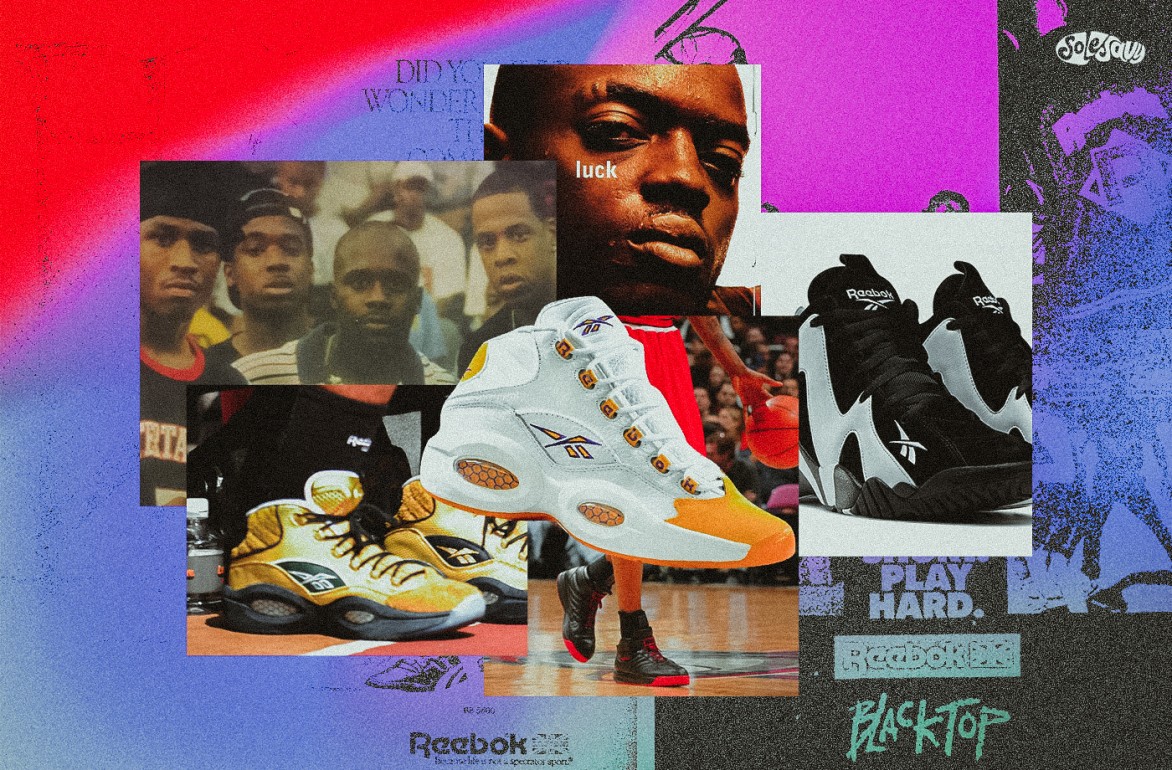Presented by Reebok
Reebok has long understood that basketball is not a country club sport.
The spirit of the game resides on the blacktop, far removed from certified trainers or air conditioning. A heart and a ball are the only amenities required to be great, with a basket or even a milk crate symbolizing the goal to get buckets by any means necessary.
Such sentiment is the calling card for Kerby Jean-Raymondâ€
In the ‘80s, Reebok rose in the game of basketball by connecting to its concrete core. Their taglines “Life is Not a Spectator Sport†and later “Life is Short, Play Hard†spoke to the ethos that their shoes were not meant to be status symbols held above the heads of others and kept clean. Instead, they were meant to be worn and worked in. This proved true for the pronounced Pumps worn in airborne assaults by the likes of Dominique Wilkins and Dee Brown in the late ‘80s and early ‘90s. It also proved true for the economy-priced Workouts the brand handed out at New Orleansâ€
Whether life was life or ball was life, Reebok was invested in the activity, not just the product. By the early 1990s, this proved true in the landscape of hoop as the brand outfitted the outdoor game with the Blacktop series, launched their asphalt approved Above the Rim line, and leaned on NBA endorsers who were both electric and of the culture like Shaquille Oâ€
Shaq resonated because he rapped, the Reignman relished because he was raw, and Nick the Quick captivated because he had flash. Despite the different sizes and styles of all their early ‘90s endorsers, all three had one thing in common: they were tough. Even with million-dollar deals and All-Star appearances, no one doubted if Reebokâ€
As the marketing around basketball changed throughout the 1990s, Reebok stayed the same. More so, they doubled down on their ethos by signing a new star to carry their brand. His name? Allen Iverson.Â
Wearing his heart on his sleeve and his crew through his aesthetic, the ever-talented underdog took the world by storm as the 1996-97 NBA Rookie of the Year. Reebok empowered the King of the Crossover to be exactly who he was, all while overcoming unfair imprisonment, shorter height, and a world out to critique his every move. This proved true on the court, in the streets, and in their ads.
By the early 2000s, Reebok was built around Allen Iverson and his toughness that grew from the blacktop. Soon, Reebok returned to their Above the Rim line and laced an array of hoopers who had playground game and palatable toughness. Guys like Steve Francis, Baron Davis, and Kenyon Martin became faces for the brand, bringing it both in the NBA and at the EBC.
By 2003, Reebok had its eyes on the next generation of basketball. Of the culture and built like a tank, LeBron James was known to be their next target. Because of this, the brand offered him a cash contract on the spot, seeding him Question PEs in his school colors way before he ever shook David Sternâ€
Famously, the I Am What I Am campaign would feature Hov, 50, and AI owning their personas whether in the booth, in the boardroom, or on the blacktop. Playground-grown pros like Jamal Crawford and Jalen Rose would wear Jay Zâ€
As the 2000s came to a close and transitioned into the 2010s, Reebok revived their basketball brand through the likes of Rajon Rondo and John Wall. Still, Allen Iverson served as the guiding light for their roster even in retirement. Remaining raw, Reebok also signed Gerald Green, a high school prodigy who lost half a finger as a youth by getting it caught dunking on a chain net.
Eventually, Reebokâ€
True to the game, Reebok brought back the likes of Shaq and Shawn Kemp while also reaching out to rappers like Rick Ross, Swizz Beatz, and even a young Travis Scott.
Often ahead of the curve, always on the pulse, Reebokâ€
With Kerby running point, a historical past behind them, and a bright future ahead, itâ€
